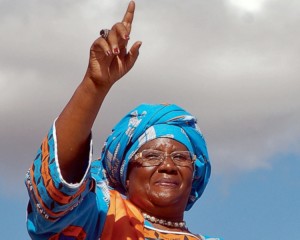By Tara Pistorese
Impunity Watch Reporter, Africa
LILONGWE, Malawi — After succeeding to the Presidency following Bingu wa Mutharika’s death last month, Joyce Banda announced during her state of the union address on May 18 that she wishes to overturn the laws in Malawi criminalizing homosexuality.

Homosexuality is a serious criminal offense in thirty-seven African countries. In Uganda, a bill was recently introduced that would make the death penalty an available punishment for homosexuality offenses. However, since the bill’s introduction, there have been discussions of reducing the imposition of the death penalty to life in prison.
According to a Human Rights First news report, lesbian, gay, bisexual and transgender (LGBT) people have become the targets of violent attacks. Two refugee women in Uganda were abducted, beaten and raped after providing assistance to LGBT refugees.
Lesbian and transgender male refugees have reportedly been the victims of “corrective rape” in Uganda, and a gay Somali teenager in Kenya was recently doused with gasoline and would have been set on fire if it hadn’t been for a Somali woman’s intervention. As it presently stands, South Africa is the only African nation with laws protecting gay rights.
In 2010, two men in Malawi, Tiwonge Chimbalanga and Steven Monjeza, were sentenced to fourteen-year jail terms after being charged with unnatural acts and gross indecency for celebrating their engagement. Although then-President Mutharika pardoned the couple on “humanitarian grounds only” after the charges were internationally condemned, he insisted that the men had “committed a crime against our culture, against our religion, and against our laws.”
Several Western countries have threatened to cut aid to countries that fail to recognize gay rights. Since foreign aid makes up a large portion of the budget in Malawi, some view President Banda’s repeal of the homosexuality laws as an attempt to appease Western donors.
In President Banda’s state of the union address she stated that her administration wants to normalize relations with “traditional development partners who were uncomfortable with our bad laws.” However, according to the executive director of the Center for the Development of People, Gift Trapence, President Banda’s history reflects a liberal attitude on the issue.
“When she was vice-president she was invited to address a group of religious leaders and she spoke in favor of including LGBT communities in HIV interventions,” Trapence said.
A parliamentary vote is required to overturn the laws and it is currently unclear how much political support the President would garner in the conservative nation. Should President Banda’s proposal obtain parliamentary approval, the repeal would be added to a growing list of Mutharika-backed policies that have been reversed at President Banda’s hand since her predecessor’s death, and would make Malawi the first African county to overturn a ban on homosexual acts since 1994.
For further information, please see:
ABC, Associated Press—Malawi’s President Vows to Repeal Gay Ban—18 May 2012
Al Jazeera (AJE)—Malawian President to Repeal Gay Laws—18 May 2012
BBC News—Malawi to Overturn Homosexual Ban, Joyce Banda Says—18 May 2012
The Guardian—Malawi President Vows to Legalize Homosexuality—18 May 2012
Human Rights First—Secretary Clinton: Help Protect LGBTI Refugees from Violence—17 May 2012



